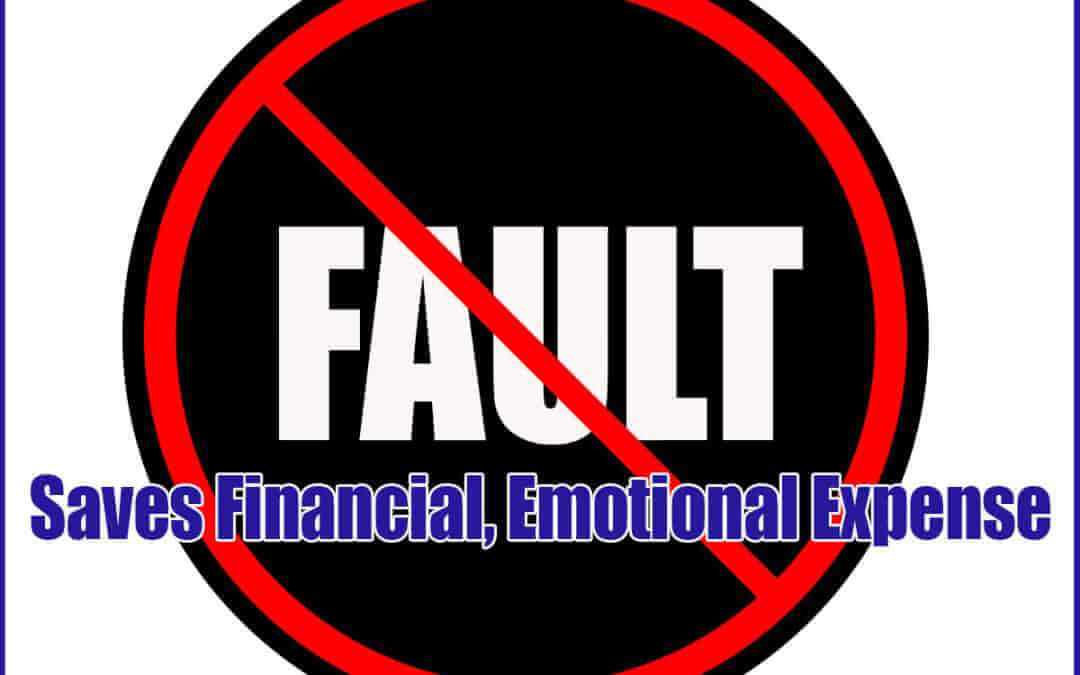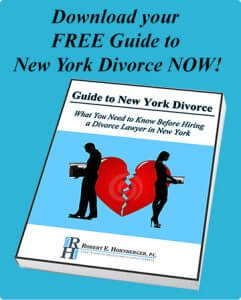As an experienced Long Island Family Law Attorney practicing in Nassau County and Suffolk County courts, I have seen first-hand how the No-Fault divorce law has simplified the process and removed a lot of the emotional and financial costs of divorce in New York.
Long Island No-Fault Since 2010
Since 2010, divorce law in New York allows married couples to divorce without assigning blame to one party. The No-Fault Divorce law allows couples who wish to dissolve their marriage to do so without providing that a spouse committed an act such as cruelty, adultery or abandonment as previously required. The grounds for a “no-fault divorce” include demonstrating that the marriage has “broken down irretrievably” for a period of at least six months, which is in many states referred to as having “irreconcilable differences.” The couple need not live in separate residences for six months, but must allege that the marriage has been “broken down” for at least that period of time. A judgment of divorce will not be granted on the grounds of “irretrievable breakdown” until after marital property distribution, custody and visitation, and spousal and child support have all been decided.
No-Fault Spares Nassau Suffolk Couples Time, Stress, Money
By removing the need to prove fault in order for divorce to be acknowledged by the State of New York, divorcing couples and the courts are spared the time consuming and costly litigation over whether a divorce should be granted and why. Instead, the focus is shifted to an outcome that is in the best interests of the children and family, and an equitable division of marital assets. The “broken down irretrievably” is a more neutral ground for divorce upon which the divorcing parties can often agree. However, it is still up to the parties to make a showing that the relationship has, in fact, “broken down irretrievably.”
Fault Divorce Still Possible, but Costly on Long Island
An “at-fault divorce” is still possible in New York. If one party accuses the other of wrongdoing, such as adultery, an at-fault divorce may be effectuated if the other party admits to the wrongdoing, or if the wrongdoing is conclusively proven in court. The party accused of cheating may or may not choose to contest the allegation. The parties may instead use the question of infidelity in negotiation as they make decisions and compromise to achieve the divorce.
Because of the increased emotional nature of allegations of adultery, abandonment, or cruelty, many couples make the choice to file for divorce on the grounds of “irretrievable breakdown” even when there has been adultery, abandonment, or cruelty. This spares a party of the litigation of a contested divorce, including the need to prove that adultery, abandonment, or cruelty did in fact occur.
Adultery Tough to Prove in Nassau Count, Suffolk County Court
Adultery can be quite difficult to conclusively prove in court. Proof of adultery requires corroborating evidence from a third party witness. The accusing spouse will not be permitted to testify. Even an admission by the accused party that he or she did, in fact, cheat is not legally admissible evidence on which to grant a judgment of divorce. The accusing party may also need to show that he or she did not encourage the behavior, forgive the behavior, or learn of the behavior more than five years prior. This type of litigation can be extremely stressful, personally intrusive, and potentially damaging to the reputation of both parties.
No-Fault Reduces Emotional Toll of Divorce on Long Island
Similarly, in a case of cruel and inhuman treatment, it may be quite difficult for an abused spouse to provide conclusive proof upon which the court can base a judgment of divorce. A victim of domestic violence who wishes to file for divorce might consider a no-fault ground rather than the “cruel and inhumane treatment ground” in order to avoid any continued trauma that could result from a divorce proceeding in which he or she might be forced to engage in a lengthy adversarial proceeding with the abuser.
Proving Fault Doesn’t Mean You’ll Get More From Spouse in Nassau County or Suffolk County Court
It may also come as a surprise that a wrongdoing such as adultery may have only a slight impact, if any, on the outcome of the divorce. The assignment of blame does not necessarily change the equitable distribution awards or the apportionment of marital assets. The judge will still focus on fairly splitting the assets and what type of custody or visitation with the children is in the best interests of the children and family as a whole. Many factors are considered by the judge in order to determine the appropriate distribution of assets and custody of children. To the dismay of the betrayed spouse, evidence or an accusation of adultery may have little effect on this calculation.
Consult an Experienced Family Law Attorney on Long Island Before Seeking a Fault Divorce in Nassau County or Suffolk County
Married couples dealing with the infidelity or abuse of a spouse should seek the advice of a skilled divorce attorney. If the terms of the divorce can be resolved privately between the parties in mediation, the spouses can be spared the time, stress, and cost of an adversarial proceeding while achieving mutually agreeable results. Reach out to an experienced Long Island Family Law Attorney at the Offices of Robert E. Hornberger, P.C. at 631-923-1910 or fill out the short form on this page to schedule a free divorce consultation with a skilled expert on your matrimonial concerns.
Download our Free New York Divorce Guide
Our 41-page “Guide to New York Divorce: What You Need to Know Before Hiring a Divorce Lawyer in New York” written by an experienced family law attorney Long Island’s Robert E. Hornberger, Esq., provides you with real information on the divorce process and the laws it rests upon in the state of New York. This book will help give you a solid foundation upon which you can begin the process of making your family’s, life better. Download your Free Guide to New York Divorce here.








